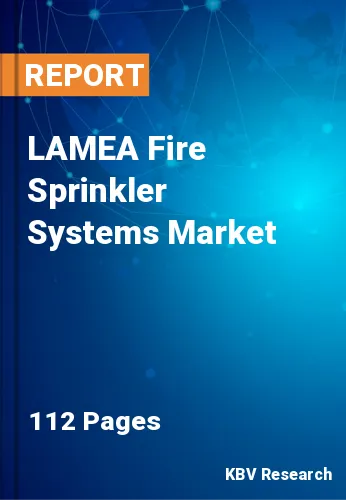The Latin America, Middle East and Africa Fire Sprinkler Systems Market would witness market growth of 9.5% CAGR during the forecast period (2023-2030).
Detection capabilities have played a crucial role in developing fire suppression systems. The most recent models are equipped with highly sensitive and precise detectors that rapidly detect the presence of smoke, heat, and flames. This improved detection accuracy assures precise activation of the sprinkler system when necessary, reducing false alarms and allowing for efficient resource utilization. These developments have improved the performance and dependability of fire sprinklers, making them indispensable for fire protection.
Awareness about the importance of fire safety has grown, not only among building owners but also among the general public. This increased awareness has increased demand for fire protection systems, including sprinkler systems. Traditionally, fire sprinkler systems were primarily installed in commercial and industrial buildings. However, there's a growing trend of residential fire sprinkler system installations, especially in high-risk areas or custom-built homes. The fire protection industry, including the fire sprinkler systems market, has consolidated through mergers and acquisitions. This trend has allowed larger companies to offer comprehensive fire protection solutions and expand their market presence.
According to the International Trade Administration (ITA), the Government of Brazil (GOB) has pursued a substantial privatization effort using a pipeline of benefit auctions and regulatory reforms aimed at tempting financing to help close the most significant infrastructure funding gap in Latin America. Activities of the Ministry of Infrastructure (MInfra) have included virtual roadshows for foreign audiences, highlighting concession opportunities in railways, airports, highways, and ports. Investment Partnerships Program (PPI) and the Ministry of Regional Development (MDR) have promoted global initiatives to compete for infrastructure project investment. In August 2022, the then-Minister of Economy of Brazil reported that the government had collected over $24 billion in concession fees and over $96 billion in committed investments. As infrastructure investments continue to rise in Brazil, the demand for fire protection systems, including fire sprinkler systems, is expected to grow. These factors will drive market growth in the coming years across the region.
The Brazil market dominated the LAMEA Fire Sprinkler Systems Market by Country in 2022, and would continue to be a dominant market till 2030; thereby, achieving a market value of $350.8 Million by 2030. The Argentina market is showcasing a CAGR of 10.1% during (2023 - 2030). Additionally, The UAE market would register a CAGR of 9.2% during (2023 - 2030).
Based on Component, the market is segmented into Product and Services. Based on End-use, the market is segmented into Commercial, Industrial and Residential. Based on Product, the market is segmented into Wet Pipe Sprinkler System, Dry Pipe Sprinkler System, Pre-action Sprinkler System and Deluge Sprinkler System. Based on countries, the market is segmented into Brazil, Argentina, UAE, Saudi Arabia, South Africa, Nigeria, and Rest of LAMEA.
Free Valuable Insights: The Worldwide Fire Sprinkler Systems Market is Projected to reach USD 14.5 Billion by 2030, at a CAGR of 7.9%
The market research report covers the analysis of key stake holders of the market. Key companies profiled in the report include HD Fire Protect Pvt. Ltd., Honeywell International, Inc., Minimax Fire Solutions International GmbH (Minimax Viking GmbH), Potter Electric Signal Company, LLC, Rapidrop Global Ltd., The Reliable Automatic Sprinkler Co., Inc., GW Sprinkler A/S, Victaulic, Johnson Controls International PLC, and Robert Bosch GmbH.
By Component
By End-Use
By Product
By Country
Our team of dedicated experts can provide you with attractive expansion opportunities for your business.

